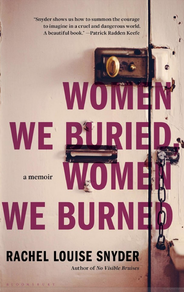A WRITER'S WIT |
MY BOOK WORLD

This book comes to me as sort of a literary triptych: 1) The author’s abusive childhood 2) The author’s pursuance and achieving of a higher education, and 3) The author’s life as a result of the first two. Oh, where to begin?
A little girl loses her mother (having been raised in the Jewish faith), and her father (a questionable “Christian”), remarries rather soon. Little girl rebels against all: her parents, her schools, all teachings that have come before. And why not? She is subject to such great hypocritical abuse by her father: formal spankings that her father rationalizes by way of the scriptures, though adult Rachel later puts those readings into context:
“The actual verse is Proverbs 13:24: He that spareth his rod hateth his son: but he that loveth him chasteneth him betimes. Interestingly, the more commonly cited ‘spare the rod, spoil the child’ isn’t anywhere in the Bible. It comes from a mid-seventeenth century bawdy poem called ‘Hudibras’ by Samuel Butler” (71).
And all the spankings ever do (as with most children) is fuel her anger. Young Rachel repeatedly runs away from home. She does drugs. She begins to work at an early age because her father gives written permission (child labor being perhaps another form of abuse). The blended family of four children broadens to include two new siblings, babes Rachel adores, though her older siblings not so much. When the two parents can no longer “control” their older brood, they pack four suitcases and kick them out. Rachel is in her teens, and she drops out of high school (or actually the school drops her, expels her for her poor behavior and academic record).
Thus begins Rachel’s education: Sensing that she is innately intelligent. But learning that if she doesn’t finish her education, she will never have a life. This long-but-short education includes working as a booking agent for local Chicago bands (which she’s excellent at), attending Barbizon school of modeling (at the behest of her Jewish grandmother) but dropping out. Eventually, she is convinced by a friend to take the GED (General Education Development) exam, which, in spite of her academic weaknesses she passes with little effort: “If everyone knew how easy the GED was, no one would ever finish high school” (161). Then she begins to attend community college, moves on to earn her undergraduate and graduate degrees related to literature and writing. Teaches, earns a living as a freelance journalist.
The third part of Rachel’s triptych consists of her adulthood. She begins by booking passage for the Semester at Sea, which changes her life’s trajectory. For many years following her education, Snyder will travel the world as a journalist and writer. She will marry a British man and have a child overseas. She will return to the US, living in Washington DC, but will travel to Arizona to help care for her second mother, the second one also to die from cancer. The most poignant section of the memoir, the last third, will pull together with the first two, to finally bring to rest Rachel’s anger with her father and her stepmother, will finally make Rachel a whole person. If not a tour de force, the book is pretty damn close.
Coming Next:
TUES: A Writer's Wit | Jane Smiley
WEDS: A Writer's Wit | Grazia DeLedda
THURS: A Writer's Wit | Christopher Buckley
FRI: My Book World | F. Scott Fitzgerald, The Crack-Up



 RSS Feed
RSS Feed